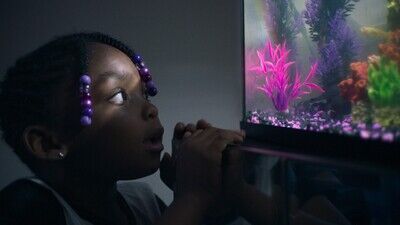As you were working with your editors over the many years that you worked on this film, how did you know this was the moment we wanted to end the film on?
NR: I think there were many ways it could end. But, I remember one day in DC, Troy was reviewing footage, messaged us, and said, “Oh my God. This moment in the car with Aubrey.” I had been in the back seat, filming it on my lap and letting her have our conversation and drive home, and it was quite a long, silent car ride. So I hadn’t watched the footage. I just experienced it and went, “Okay, maybe it could work, but you look at it.” And he was like, “This is really powerful.” Once I went back and looked at the footage, we could just feel that that moment was the end, and that never wavered. Getting to the end, and all the things in between always changed, but that moment, that one shot uninterrupted of the truth that you see and how she responds to her father, and then she closes her eyes, and the sun comes across her face, and it stays calm like that. It was kind of magic, and it was always the film’s end.
AP: I think for me, when Natalie reached out to me and said, “I think we have enough for you to look at now,” from Troy and Adelina, our amazing editors, and we all spent three weeks in a small room looking at it again, I thought that we were ready. Because we didn’t have this bow wrapped around it with the dance. I really appreciated the coming-of-age story and how we were able to show many different lived experiences and show the audience that to create that family unit and continue to bond and strengthen and show love, you have to keep doing the work. So, the end of the film doesn’t leave you with a solution, but it leaves you wanting to see what you can do better. And it also makes you want to help someone else do better, right? I thought that if I was feeling this, and I’ve always felt like I was in a little box by myself seeing it, and now we captured it on film, then we knew it was time to submit the film to Sundance.
Are there any women who’ve made films or films that are directed by women that have inspired either of you in your life, or that you just really think people should seek out?
NR: There are filmmakers who do inspire me. I like the rawness of Andrea Arnold and Lynne Ramsay, who are more narrative filmmakers. Ava DuVernay makes real, true stories told in such powerful, cinematic ways. I’m drawn to that.
AP: Ava DuVernay inspires me because she makes sure Black stories are protected. That’s my numero uno. I appreciate how she not only protects our stories but tells the truth and is really honest. Also, not only is she speaking to a Black audience, she’s speaking to everyone, so we all can be aware, and we can all do differently. She tells untold stories. I think that is a message we all need to hear, but it’s also rare, and she does it with such a big heart. So, I appreciate her approach.
